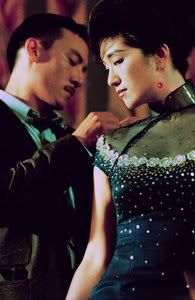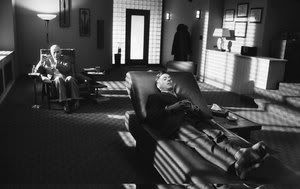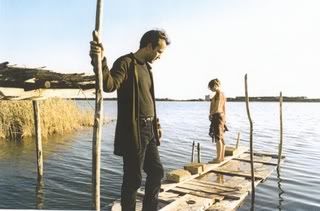The sultry image of the film's poster reveals a sillhoute of bright, electrified red stocking being pulled as if someone is about to wear it, and the color is seductively crashed to the black background, suggesting mystery awaits to be unlocked. An erotic mystery, perhaps?
Or it could be exotic, given the fact that three renowned directors handling this anthology could not be more different from one another. Wong Kar Wai can be considered as one of the last remaining auteurs in the world of modern cinema with a meticulous understanding on heydays of Hong Kong and China, Steven Soderbergh is an all-American director working and living as part of Hollywood industry who injects a certain edgy style in his commercial works, and Michelangelo Antonioni has contributed his outstanding works shown in his past as collection of art worth studying by film enthusiasts throughout the world.
Yet, the signatural mark among the three shorts can only be found in "The Hand", Wong's section that aptly opens the whole film. As previously used in his well-known In The Mood for Love and 2046, the world of cheongsam and '60s Hong Kong as seen through the eyes of his long-time collaborator, Christoper Doyle, suits perfectly to the story which tells about an illicit affair done by a tailor (Chang Chen) and his muse (Gong Li). What starts off as a mere working relationship blossoms into an unrequited longing for self-fulfilling desire, for the tailor in his frequent silence keeps looking upon the woman, protecting her in unspeakable action, and proving himself to be a faithful companion towards her final days.

Whereas it offers nothing new to the collection of his auteurism, Wong understands the meaning of subtlety by letting the images speak more than unnecessary words as what he usually indulges in. The implicitness of eroticism turns to be explicitly loud by only showing the shaking walls with breathing and gasping sound in the background, while the camera extensively moving through the landscape of interior details. Not to mention that both cast is allowed to keep their clothes on all the time, allowing audiences to witness to explore their barenaked thoughts as reflected on their studious gestures. The way Chang stroke his hand passionately through the stack of clothes, thus the title is given, and the manner in which Gong presents herself as a lady with a sense of vanity remind us that being sexy in a big screen is about how much something is revealed by showing a little. An old school concept which still works after all.
In contrast, this is something we will not see on the following two films.
"Equilibrium" is supposedly a comedy of manners done through the surrealistic style where we actually need to figure out if what we see is actually a dream or a reality, thanks to the interchanging scenes in which Robert Downey Jr.'s character turns into Alan Arkin's at the end of the film, and vice versa. A seemingly dreamlike film, if by now you are already familiar with the concept of Banyu Biru, although the latter may not be an effective example here.

However, the only thing that impresses me most from this part is the stark black-and-white cinematography, which brings to mind as a reminiscence of recent works like Schindler's List or The Man Who Wasn't There. It may be used merely to differentiate one scene from another, yet the effectiveness of using the dual-color actually heightens the otherwise lack of depth story here, which ironically is the most talkative section among all three.
At least, we have not come to the worst part.
By any respect of his great stature existence in the film history, I salute Michelangelo Antonioni for his past work like L'Avventura, L'Eclisse or La Notte. Regrettably, we are unable to trace his graceful style of filmmaking in his contribution here, "The Dangerous Thread of Things". Such a poetic title might give inspiration to any porn-film producers, for Antonioni takes a dramatic turn in making his short film here as a semi-porn flick with nothing but parading flesh under the Tuscan sun, and lines directly taken off from Harlequin books. Adding salt to the wound, none of the actors seem to understand how to perform in front of camera.

From the magnificent beginning of old Hong Kong style through America in 1950s to the crashed ending of mind boggling ending in Italy, the film ends with a high anti-climaz note, leaving me in puzzledness over the latter choice.
Don't get me wrong, it's just some successful guy wanting to take a break being considered 'serious', and chooses to indulge himself in erotic journey above all.

6 comments:
Apakah inih hasil coffee bean semalam?
lope
-iu-
IU,
lebih tepatnya inilah hasil ngantor seharian kemaren, huhuhuhuh! :D
mpal, mungkin erotisnya mirip scene daniel day lewis ciumin sepatu nya michelle pfeiffer di age of innocence ya? merinding lho gw liat scene itu.
Van,
*baru nyadar*
iya, erotis yang ngga diumbar gamblang, tapi di the age of innocence juga ada adegan yang bikin gue jerit saking penasaran. pas adegan di dalem kereta (mobil jaman dulu), pertama kali ketemu kan nahan2 supaya ga pegangan tangan tuh michelle pfeiffer ama daniel day-lewis, dan cara mereka nahan emosi ... ckckckckck ... bikin gue speechless ...
The hand, I really like that part.
very very wong kar wai !
dahsyat banget !!!!
Ben,
ciri khas nya Wong Kar Wai emang ga bisa lepas dari Christopher Doyle kalo dah bikin period pieces :)
Post a Comment